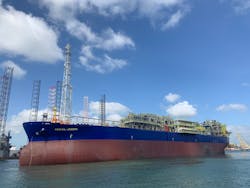Out of a global total of 28 FPSO vessels that are under construction, 22 are being built at shipyards in China, South Korea, and Singapore. Rystad Energy expects the outbreak of COVID-19 to cause extensive staffing and supply shortages in these countries that will in turn delay project deliveries by at least three to six months.
If the pandemic escalates, the delays could increase to nine or even 12 months, especially considering the restricted time windows for heavy transport, installation, and hook-up, the consultant said. The average development time for an FPSO is 36 months, meaning that companies could face a 30% delay.
Audun Martinsen, Rystad Energy Partner and Head of Oilfield Service Research, said: “Although operators and contractors are looking into ways to make up for some of the time that will be lost by fasttracking other stages of development, we anticipate first oil or gas for these projects will face clear delays.”
At present, 28 FPSOs are under development globally, 15 of which are being built in China. Seven are under construction in COVID-19 hotspot South Korea as well as in Singapore, while six additional vessels are being constructed elsewhere.
Many Chinese workers received a holiday extension in early February after the Chinese New Year, aimed at limiting the spread of the coronavirus. However, even as workers return to the yards, Rystad expects projects may still have to contend with 30% to 50% fewer work hours.
Construction progress may also be slowed by supply delays, as the delivery of bulk materials, modules, and equipment is hampered by transportation restrictions both within and outside of mainland China. According to the consultant, the plant utilization rate in China’s equipment manufacturing sector has fallen to less than 10%.
In addition, project management will face severe issues as travel bans restrict contractors, engineering firms, certification companies, and E&P officials from accessing shipyards.
Experts do not yet know when the effects of the pandemic will ease, but one thing remains clear: the virus is not limited to Chinese fabrication yards – it affects the entire global service industry.
As the virus has caused reduced industrial activity and travel restrictions in China and beyond, much of this year’s global expected oil-demand growth will be lost, according to Rystad.
Lower oil prices have resulted in oil and gas companies scaling down their flexible investment budgets, especially shale operators in the US as well as some offshore exploration and production players.
“Our current assessment forecasts that COVID-19 could result in global E&P investments falling by around $30 billion in 2020 – a significant hit to the industry,” Martinsen concluded.
Anyala-Madu FPSO sets sail for Nigeria
Keppel Shipyard has delivered what it claims is the world’s fastest brownfield FPSO modification and upgrading project safely and on time. The FPSO Abigail-Joseph was delivered to Yinson Nepeta Production Ltd., a wholly-owned subsidiary of Yinson Holdings Berhad.
The project was delivered in less than seven months, according to Chris Ong, CEO of Keppel Offshore & Marine.
Keppel’s scope included refurbishment and life extension work, engineering and procurement, fabrication and installation of new structures including the helideck and riser balcony, as well as the installation, integration, and completion of topsides modules.
Chartered by First Exploration and Petroleum Development Co. Ltd. on a firm seven-year contract with options to extend, the FPSO will be deployed at the Anyala-Madu field in OML 83/85 offshore Nigeria.
The FPSO Abigail-Joseph has a processing capacity of 50,000 b/d of oil and 60,000 b/d of liquid. It also has a gas compression capacity of 34 MMscf/d and a storage capacity of not less than 550,000 bbl of oil. It is designed for 15 years of operations without dry docking.
Lankhorst ropes to moor second Liza FPSO
SBM Offshore has contracted Lankhorst Offshore to supply the deepwater mooring lines for the FPSO Liza Unity for ExxonMobil’s Liza Phase 2 oil field development offshore Guyana.
The FPSO Liza Unity will be spread moored at a water depth of 1,600 m (5,249 ft) with 20 Cabral 512 deepwater mooring lines with a minimum breaking strength of 12,300 kN. Each mooring line measures 2,320 m (7,612 ft) in length. When deployed the mooring line will comprise a chain top segment, polyester rope middle segment and chain bottom segment, connected to a suction pile anchor.
According to Lankhorst, the ABS class approved Cabral 512 rope construction features a specially designed filter, preventing ingress of sand while the mooring lines are pre-laid on the seabed ahead of the FPSO arriving on station. •
About the Author
Jessica Stump
Editor
Jessica Stump is editor of Offshore Magazine. She uploads and writes news to the website, assembles surveys and electronic newsletters, and writes and edits articles for the magazine. She was the summer editorial intern at Offshore in 2009 and 2010 before joining full time in April 2011. She has a journalism degree from Texas Tech University.

